
Table of Contents
- Goat Milk for Dogs
- Goat’s Milk Benefits
- Goat’s Milk Caution
- Tips on How to Feed Goat's Milk For Dogs
- Commonly Asked Questions
- Goat's Milk for Dogs Final Thoughts
Have you ever heard of goat's milk for dogs and wondered if it is safe? What are the benefits? Well, we've got you covered.
As pet owners, we want what’s best for our fur buddies. Feeding them the best diet to boost their immune system for a better quality of life is something we can do in exchange for the joy they bring to our lives.
But is milk bad for dogs?
No! There is no doubt dogs love the creamy and slightly sweet flavors milk offers. Milk has always been considered to provide additional nutrients in our pet’s diet.
But what is the best milk that could provide what our buddies need?
Since some puppies and dogs are prone to lactose intolerance, which can cause some unpleasant reactions, we must make sure we give them what's suitable for their health.
Adult dogs are more likely those who can not digest milk properly. So, if you’re going to give them milk, watch out for symptoms that can determine if your pet is lactose intolerant first.
Rearing puppies can tolerate milk when it comes from dogs’ milk. Since weaning milk from other dogs isn’t always an accessible resolution, Veterinarians and Food Developers have come up with solutions.
It is good for infants, but it can also be for mothers and dogs of stages. And this is Goat's Milk for Dogs.
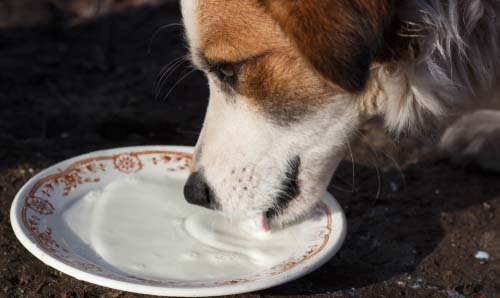
Goat Milk for Dogs
Goat’s Milk has been one of the milk that has been recommended to pet owners. It is said to be more stomach-friendly and healthier.
Goat’s Milk contains less lactose than cow’s milk. This enables them to ingest the milk without creating harmful effects on their digestive tract.
Since dogs can not produce lactase as much as cow’s milk contains, it can result in damaging effects on their digestive tract. Cow’s milk, especially when raw, is not recommended by veterinarians.
There are great deals on why Goat’s Milk will be perfect for your fur buddy. So let’s take a walk through some of them:
Goat’s Milk Benefits
Best Supplemental Nutrients for Your Dog
Milk has always been a good choice if you want to provide some supplemental nutrients for your dogs. Goat’s milk consists of more nutrients than cow’s milk or other milk.
Since dogs require inorganic nutrients that are not produced in their body, supplemental food such as goat milk can provide such.
Of course, our dog’s food choice isn’t always the healthiest, but we can always try giving them new flavors with a healthier twist.
Goat's Milk Digestible Protein
Goat’s milk consists of a very digestible protein that helps our pets ingest its properties much more quickly and efficiently. This protein helps the nutrients be distributed and absorbed more in your dog’s body.
Amino Acids and Taurine in Goat's Milk
It also contains essential amino acids such as methionine, which helps detoxify the urinary and liver organs to lessen the risk of diseases such as urinary stones.
Goat’s Milk also has taurine to help cardiovascular health and function.
Calcium and Magensium
It also contains calcium, which helps in bone development, and phosphorus, which helps in the absorption of calcium.
Goat milk also includes magnesium in its nutritious fraction, it’s essential to make sure your dog has enough magnesium in their diet to enable healthy and normal bodily generation.
Along with the bones, it also has nutrients that produce hemoglobin and red blood cells. Iron is also found in Goat’s Milk.
Fatty Acids in Goat's Milk
Goat’s Milk also consists of fatty acids. Fatty acids help your pet limit pernicious activities in the stomach.
This can also be an energy source for your pet. These energy sources, along with protein and fatty acids, are perfect for your dog’s metabolism and development.
These components help flourish growth, improve their response health-wise, and enable them to gain the energy source they require.
Fats can also help trigger their sense of taste and smell. Since goat’s milk is thicker than cow's milk, it also contains more fats, and these help your pet’s appetite chomp down its meal.
Potassium
It also includes Potassium. This helps in muscle functions, especially in muscles and nerves.
Not all dogs can behave when it comes to taking their vitamins or medicines. Goat’s Milk is a huge assist in this area.
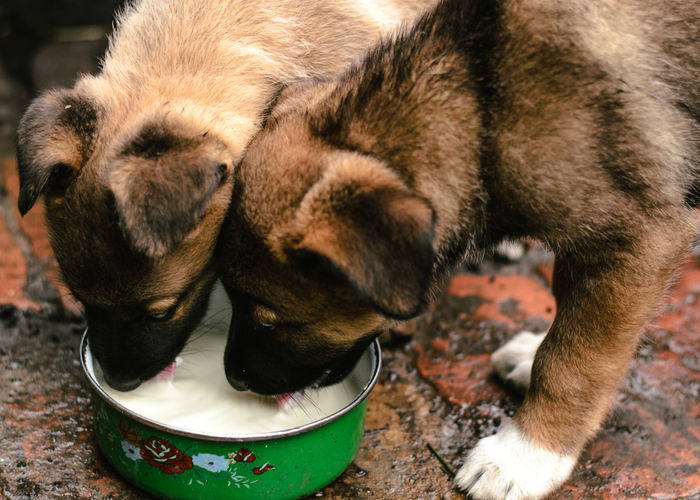
Additional Hydration With High Concentration of Water in Goat's Milk
Goat’s Milk comprises water. Research finds that Goat's Milk contains the most water content among the milk from various animals that were tested.
This can help your fur buddy get the hydration they need along with other supplemental components it has.
If you have a picky fur baby that’s not a fan of drinking water, you can sneak some Goat’s Milk into their diet at intervals. Exposing them more to water may help trigger their thirst and need to drink water.
If not so, goat’s milk can be given in small amounts, mixed with a substantial amount of water, to deceive them into liking water.
Less Risk in Milk Allergies
Although cow’s milk has some good qualities, it’s not compatible with your pet’s circumstances. Some nutrients in Cow’s Milk may harm the gastrointestinal tract of our fur buddies.
Meanwhile, Goat’s Milk consists of enzymes that help your fur baby restrain allergens. Introducing Goat’s Milk to your pet at a young age can help them develop this.
It is less harmful in its gastrointestinal functions, unlike cow’s milk. Since goat’s milk includes fatty acids, these fatty acids comprise anti-inflammatory components that help their intestinal wall respond and better manage inflammation in the stomach.
Prebiotics, Less Tummy Aches
Your dog’s health relies primarily on what they consume. So we have to be careful with whatever goes on their stomach. Fortunately, Goat’s Milk is also a great source of prebiotics.
It has enzymes to help your dog have a balanced bowel movement and a better immune system. Good bacteria will help protect your dog from latent pathogenic bacteria that can cause disease or infections.
Since we can’t always be aware of what they're licking or nibbling, it’s inevitable for your dogs to have some stomach ache moments.
When your pet has an upset stomach, you can serve them goat’s milk to ease the pain and help their stomach to settle.
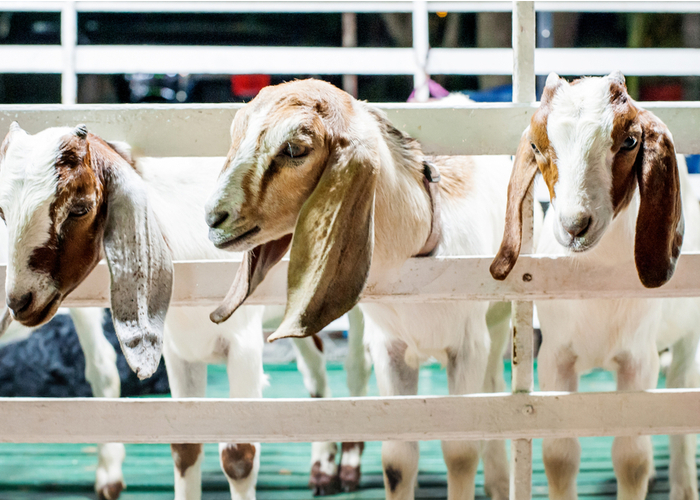
Fermented Goat’s Milk for Dogs
The difference between raw and fermented is quite significant. Raw milk is heated or not at 117 degrees. At the same time, fermented dairy is refined chemically.
Fermented Milk has more live microbes and probiotics that are good for the body. The process eliminates harmful bacteria like E.coli, Salmonella, Brucella, etc.
Since you cannot consume raw milk due to severe possible illness risks, fermented is a much more suggested choice for milk. Goat’s milk's fermented form is the same.
Fermented Goat’s Milk has prebiotics and probiotics. This means the good bacteria are developed and enhanced for more beneficial utilization.
Studies find Fermented Goat’s Milk helps dogs with chronic diseases. The postbiotics terminate harmful bacteria in the digestive system and aid the gut linings in the dog’s stomach.
It's also found to help in Joint Health. Dogs with Arthritis and other Joint-related ailments. Since it comprises enzymes that alleviate pain and inflammation.
Understandably, fermented products are a much more careful choice for both owner and pet. It can alter your pet’s health with its preventive and beneficiary functions.
Goat’s Milk Caution
Although Goat’s Milk has been a massive success in supplementing nutrients to animals, remember not to give your pet raw milk. That goes for both cow’s milk and goat’s milk.
Raw milk may contain pathogens that require removal. It might still contain pathogens such as E. coli, salmonella, and listeria in unpasteurized milk.
This may cause compromise in your and your pet’s immune system.
If your pet has a history of pancreatitis, don’t let them intake goat’s milk since it has a large amount of fats in it. This may aggravate your dog’s condition.
Goat’s milk or any milk is also not recommended for dogs with skin or digestive issues.
Goat’s Milk makes a fantastic contribution to our dogs' health. In a single serving, the quality of your dog’s health increases!
If you want your fur buddy to have a taste of Goat’s Milk and its perks, make sure to check if they’re lactose intolerant before anything else.
If you have decided to give your dog a try Goat’s Milk, introduce it gradually. Small amounts of it at intervals can help their digestive system recognize and prepare for the nutrients it can absorb from the milk.
Nevertheless, we should be responsible owners and check with our veterinarian/s regarding what our pets can consume. It’s better to double-check and set anything to prevent medical complications.
If the veterinarian gives it a go, there’s no problem giving it to your fur buddy. Remember to take note of your veterinarian’s direction regarding the amount of Goat’s Milk your dog can consume or brands that they recommend and avoid.
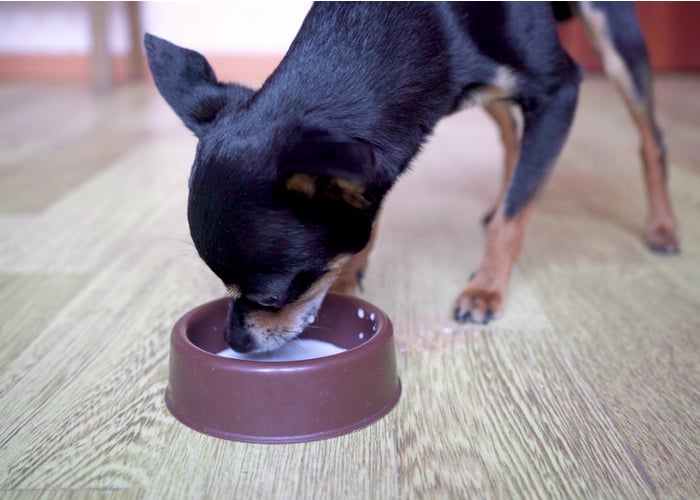
Tips on How to Feed Goat's Milk For Dogs
Meal Topper
The first thing you can do is add a little bit of goat's milk for dogs on a dog cereal. It is a great way to add more moisture, probiotics, and flavor to your pup.
If your dog is on a kibble diet, it can benefit a lot from a moisture boost. But don't worry; it also has benefits for dogs with raw diets.
Rehydrating Freeze-Dried Dog Foods
Freeze-Dried Dog Foods have been a popular choice of diet lately. But now, instead of using play water, you can use goat's milk instead for rehydrating your freeze-dried food.
This technique is great for picky eaters to help maintain healthy eating habits and for those who need an extra digestive boost.
Frozen Dog Treats
Suppose you're making homemade dog foods and want to make frozen dog treats. Instead of using yogurt, you can now use goat's milk.
Mix it with pureed fruit, peanuts (safe for dogs), butter, or bone broth for a great healthy snack.
Commonly Asked Questions
Can I give my dog goat’s milk daily?
Goat milk is not advisable for daily consumption. They can be given at intervals during meals now and then to boost appetite or enhance the flavor if they are uninterested in their meal.
Can I mix goat’s milk in my dog’s food?
Yes. There are many ways to serve Goat’s Milk in your dog's food. Like cereal, you can add goat’s milk to their dry food.
This is great for fur babies who are pretty picky with their kibbles. You can also add it to their wet food for more umami flavor in their meal.
It’s also good to lessen the dog's dry food portion if mixed with Goat’s Milk.
Will goat milk make my dog gain weight?
Yes. Goat’s Milk can help increase your dog's weight. This is why it is recommended to be given to malnourished puppies or dogs.
Since Goat’s Milk is loaded with supplements, this can help the dog gain the normal weight range. It’s best to provide them with activities to match the number of accessories they gain.
Remember, Goat’s Milk contains fats, which is their energy source, and if they cannot release this energy, it might lead them to gain weight.
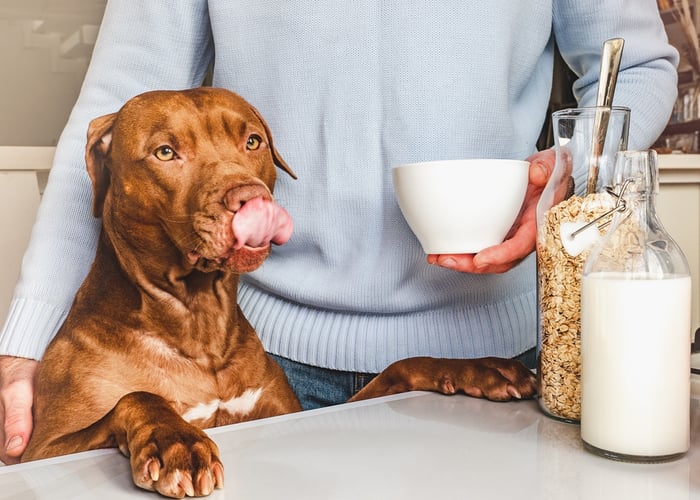
Goat's Milk for Dogs Final Thoughts
Being attentive to what milk you give your pet will help avoid risks and health problems before taking place. Milk is an oral supplement and beverage, so internal ramifications are more challenging to mend.
So for that, I believe we have answered your question, “Is milk bad for dogs?”.
In recent studies, we've found out that goat's milk for dogs is a great healthy alternative to cow milk. A few benefits of goat's milk are that it can provide nutrients to our pups.
Goat's milk can provide protein, amino acids, taurine, calcium, magnesium, fatty acids, and potassium.
Goat's milk can also be a way to hydrate your dog. And if your pup is allergic to cow milk, here's the solution for you.
READ NEXT: CAN DOGS DRINK MILK?












